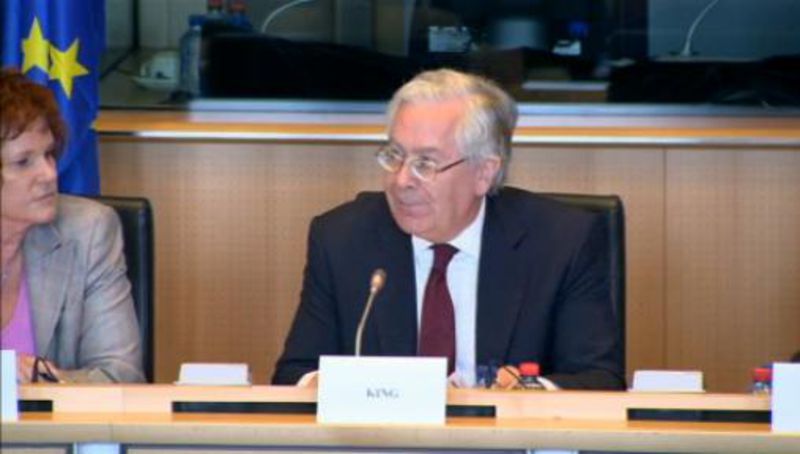"It should be said what was the reason for the taming of the budget deficit of Bulgaria"
Adelina Marini, November 18, 2009
 This is what the managing associate of Industry Watch said in an interview for euinside regarding the boasting of the deputy prime minister and minister of finance Simeon Dyankov that the government had managed to tackle the budget deficit and in October the budget was balanced. And last week Mr. Dyankov said that according to the Commission autumn forecast Bulgaria would be one of 5 EU member states which will end the year without an excessive budget deficit (under 3% according to the Stability and Growth Pact). The 2010 Budget, approved in Parliament without any discussion for the first time in history, the government has also planned a less than 3% budget deficit. The minister of finance said then that our country will be the only EU member state without an excessive budget deficit for 2010.
This is what the managing associate of Industry Watch said in an interview for euinside regarding the boasting of the deputy prime minister and minister of finance Simeon Dyankov that the government had managed to tackle the budget deficit and in October the budget was balanced. And last week Mr. Dyankov said that according to the Commission autumn forecast Bulgaria would be one of 5 EU member states which will end the year without an excessive budget deficit (under 3% according to the Stability and Growth Pact). The 2010 Budget, approved in Parliament without any discussion for the first time in history, the government has also planned a less than 3% budget deficit. The minister of finance said then that our country will be the only EU member state without an excessive budget deficit for 2010.
In an interview for the Bulgarian daily "24 hours" the co-chairman of the small right-wing Blue coalition warned: "The attempt to show that we are doing well with the deficit is quite and early assumption. Because it might prove that certain operations like not returning tax credits, hide part of the debt of the state. The state might have taken hidden debt, signing contracts without having money to finance them and this, indeed, would be very hard. From this point of view, the attempt to show that the government is getting over the problem is quite untiming. Because it is not. The picture that the revenues will be 6.4 bn lv is wrong, we should expect at least another 1 bn deficit".
"My personal opinion is that we have significant spending cuts and not an improved tax collection what you might here in support of the minister. I think that we have a situation which was relatively difficult politically - a budget deficit, they had to react immediately, to cut spending. And from this point of view, we might interpret this as a positive result, something like a success of this government. But let's not forget that those are short-term successes. Next year new demands for money will be raised from different groups, and the pressure over treasury will increase. In other words, in the long-term the problem is still far from solved", Georgi Stoev added (you can read the whole interview with him later on euinside).
According to Mr. Stoev, the planned 2% economic contraction is also unrealistic because the nominal decline in Bulgarian lev (1 lev=1.95 euro) is much bigger - 4.8%. "This means that the economy, measured in levs or euro will contract with nearly 5% next year and together with this the government forecasts the budget to grow. This is either too optimistic because of the expectation that you will seize larger part of the incomes in the economy and pour it into the treasury or this is some kind of, let's call it a mistake in the forecasts of the Ministry of finance. Traditionally, when an economy is contracting, the expectations for the revenues in the budget should also be in contraction", the managing associate of Industry Watch added.
The bigger optimism in Budget 2010 will definitely lead to a revision next year, the expert said. And this would be much harder politically. This year all measures related to spending cuts were  largely supported because of the failure of the previous government. "The questions is that if in the middle of next year the government would decide to do the same which includes cutting of administration, of some public projects, subsidies, in other words the incomes of people who depend on the budget - they might be a minority but still these people are a very well organised group of voters. Let's not forget that these people, after all, formed part of the election vote for the ruling party GERB and the moment when GERB will have to take unpopular measures will certainly come. They will have to cut public spending, including for some of their voters. Then it would be difficult". Georgi Stoev forecasts.
largely supported because of the failure of the previous government. "The questions is that if in the middle of next year the government would decide to do the same which includes cutting of administration, of some public projects, subsidies, in other words the incomes of people who depend on the budget - they might be a minority but still these people are a very well organised group of voters. Let's not forget that these people, after all, formed part of the election vote for the ruling party GERB and the moment when GERB will have to take unpopular measures will certainly come. They will have to cut public spending, including for some of their voters. Then it would be difficult". Georgi Stoev forecasts.
The former prime minister Ivan Kostov also criticised the expected 2% downturn. "I think that the government has underestimated the downturn. I am certain that next year it will be much bigger than 2%. I can even commit to a forecast of 3.7%. So, the revenues will appear overestimated and practically a whole new group of problems will appear for the budget itself. I think that this is a reason for the government to say that in the middle of year the budget will be revised. Of course, the minister of finance is supposed to inspire optimism but behaving like this he creates expectations which might turn against the government tomorrow", Mr. Kostov added for the "24 hours" daily.
 | © European Union
| © European Union | © European Union
| © European Union | © European Union
| © European Union